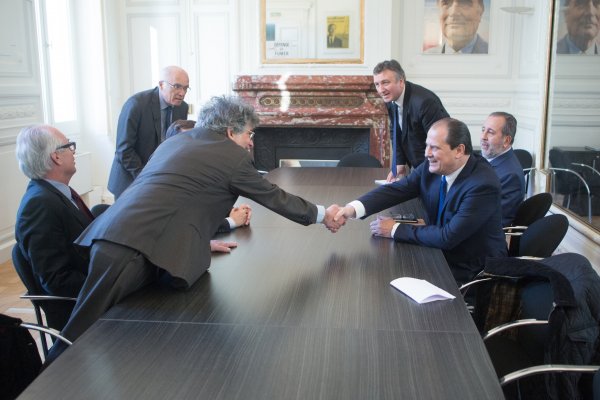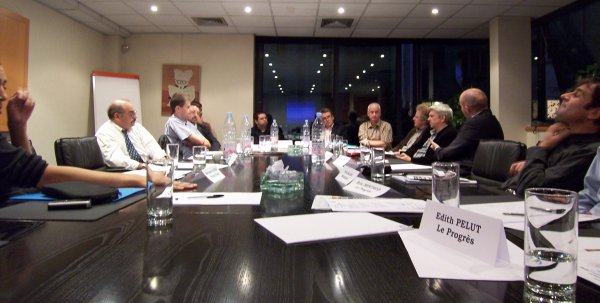Business Culture: Business Meetings
The older generation of French businesspeople, as well as most people working in French domestic businesses, conduct business at a relatively slow pace compared to others in their region. Time is approached with a nonurgent attitude. However, younger, MBA-trained French executives and those who are experienced in international business deals are increasingly becoming more sensitive to the needs of their transactions, and thus proceed at a faster pace. Although the French are accustomed to international business relationships, they are not always willing to change their business style to accommodate foreigners, so it is vital that visitors show respect for French history and culture.
Visiting businesswomen are welcome in France. Women in France are expected to be assertive and outspoken, not timid or passive. Foreign businessmen are expected to be chivalrous to women in France.
Preparation
The French tend to take considerable time to build trust and to establish the basis for a loyal business partnership. Do not rush or attempt to skip this process, as it is considered essential in French business culture. Plan initial meetings to be of a predominantly social nature. Subsequent meetings will be more business-focused.
Business relationships are formed between companies as well as between individuals. The French typically assume that you are willing to make a long-term personal commitment to a business partnership with them, and if trust is well established, any replacement of a team member in the course of your dealings will be quickly accepted.
You are expected to arrive at the meeting well prepared and focused, not only with the relevant statistics and reasonable arguments, but also knowledgeable regarding your French counterpart’s company. Establishing an agenda upfront is advisable, but not always necessary. When you arrange meetings, provide details on titles and seniority of all attendees.
Scheduling
Make sure that you schedule meetings with executives on your level. French firms tend to be organized hierarchically, and you will create a poor impression if you meet with French executives who have a lower rank in their firm than you do in yours.
Write your letter of introduction months ahead of your arrival, as the French resent time pressure, especially when exerted by strangers. E-mails, because of the implied expectation to respond immediately, often go unanswered. Without a prior relationship, phone calls will usually be abrupt. Face-to-face meetings are the best way to proceed, and it is recommended that the first meeting be between the team leaders or senior executives, to establish and solidify a relationship before involving the rest of the team. This meeting will be almost completely of a social nature, and if it runs long, you can assume you have made a good first impression. Follow up on the first meeting with a polite and formal thank you letter, including a request to schedule a second meeting.
Keep in mind that the French have a relaxed relationship with time. Meetings often run late, and may be rescheduled or cancelled at the last minute.
Try to schedule meetings at least two weeks in advance, for the hours of 11am or 3:30pm. Business discussions are common during lunch, but do not suggest working "through lunch." It is rare to discuss business during dinner. Office hours are officially 9am to 5:30pm, but senior executives often stay later. It is considered acceptable for you to arrive up to 10 minutes late to a meeting. Call ahead to apologize if you expect to be later than that.
Avoid scheduling meetings around the Christmas and Easter holidays, and during the summer vacation months of July and August.
Business Attire
Clothing and fashion are held in high regard in France, so be conscious of your appearance and wardrobe decisions. Wear high-quality conservative clothing and be well-groomed. Men should wear dark suits and neckties. Women should wear stylish business clothes in soft colors, elegant jewelry, and light makeup. Sneakers and walking shoes are never worn in public (except to play sports), not even to walk to a business meeting. Shoes should be polished.
If you receive an invitation to a social event that states "informal dress," this does not mean a T-shirt and jeans, but high-end, tasteful clothes, including a jacket for men.
Meeting Protocol
First impressions are very important in France, as the French rely heavily on their instincts, so pay close attention to cues. Always be respectful and reserved rather than emotional.
Entering the Meeting Room: Hierarchy
Allow any women to enter a room first, followed by the most senior executives. Men are expected to be chivalrous; for example, to always open doors for women.
Introductions
Shake hands with all participants at a meeting upon arrival. The French customarily shake hands with everyone they meet during the course of the day, even if they see one another daily. Allow women to initiate a handshake with men. The handshake should involve a light grip and a quick shake, while maintaining direct eye contact. It is not necessary to smile. Exchange business cards.
Forms of Address
Use Monsieur, Madame, or Mademoiselle, or the English forms, Mr., Mrs., or Ms., followed by your colleague’s family name. Older women are addressed as Madame; to use the title Mademoiselle would imply that an older woman is a spinster. When speaking French, even when you are invited to address a French counterpart by his or her first name, continue to use the formal vous as opposed to the informal tu. Use vous also for secretaries and interpreters, and whenever in doubt as to which is appropriate. If you transition to the familiar use of tu with a French businessperson, do not revert to vous, as this is would be considered an insult.
The French often have difficulty determining the names of foreigners, often mixing up first names with family names. To clarify, fully capitalize your family name in all written correspondence.
Business Cards
Almost all French businesspeople read English, so it is not necessary to have your business card translated into French.
The French like titles, and there are many in the French business hierarchy, such as Administrateur, to denote a senior officer. Your business card should include your professional title, particularly if it grants you the seniority to make executive decisions. It is common for doctoral degrees to be noted on business cards, but not lesser academic titles.
At the first meeting, when exchanging cards, take a few moments to study your counterpart’s card before putting it away, as a cursory glance can be misinterpreted as disinterest.
Body Language
Always make direct eye contact with your French counterpart, even when using a translator. Do not smile unless you are smiled at. The French typically consider vague smiling to be indicative of an empty mind.
The French stand relatively close to one another when talking, at a distance of less than a meter apart.
Body language and manners should remain conservative, even when discussions become heated. There is usually little physical contact.
Keep in mind that the American hand sign for okay (thumb and index finger forming a circle) signifies zero in France. Slapping an open hand over a fist is considered a rude gesture.
Try not to take notes during meetings, especially if you are a senior executive, as this creates a bad impression.
Meeting Starters: Small Talk versus "Getting Down to Business"
It is customary in France to engage in small talk before starting the meeting, with the goal being to build trust and to establish a firm basis for a working relationship. Your French counterpart will typically want to establish whether he or she would want to develop a social relationship with you and do business with you over time. Small talk will typically include questions regarding your philosophy on life, your background, your education, and your connections within your country. It is advisable to arrive at the meeting well versed in the history of your counterpart’s firm and with ready compliments.
The French will often discuss literature, history, and politics, but it is best to avoid discussing World War II. French cuisine and wine are safe topics. Do not ask personal questions (such as how old a person is or how much money he or she makes) and do not mention your life partner or your children unless asked about them.
Name-drop in a subtle way, and if you have a degree from a prestigious university, find a way to slip that detail into conversation.
Conducting the Meeting
Meetings are conducted in a fluid, informal manner, with several discussions going on at the same time and little adherence to a meeting agenda. Opinions are exchanged freely on all issues, even ones that do not seem relevant to the topic at hand.
Introduce your business proposal slowly, with your facts organized into positive and negative reasons for the deal. Be prepared for lengthy debates.
Always be diplomatic, and do not overtly cast blame. If you are somehow disappointed with your French counterpart, reference it indirectly or not at all; direct confrontation will be seen as overly aggressive. To the French, preserving personal dignity, and thus the relationship, is more important than getting the job done.
Although money is an important issue in any business meeting, it is considered vulgar to bring it up too early in the proceedings.
Expect your French counterparts to allow multiple interruptions, such as phone calls from family members and unannounced walk-ins by other colleagues.
Decision Making
Decision making in France is protracted. French firms allow many executives to express their views on a proposal in order to create a good feeling. The process itself of weighing alternative proposals is considered a worthy intellectual pursuit, not just a means to an end. There is a tendency to focus on minutiae, which inevitably slows down the decision-making process.
In France, final decisions are made exclusively by senior executives, who may not attend meetings with you, but will rely on input from their subordinates.
The French typically focus on logical solutions to problems. Although they revel in vigorous debate and in the exchange of creative ideas, when it comes to making decisions they tend to prefer conservative options that do not deviate far from the norm. If you wish to persuade them to take a business risk, make sure you are well informed and can handle a battery of questions. If you display high intellect and have a thoroughly researched and planned proposal that focuses on long-term objectives in particular, you stand a good chance of persuading them to try something new.
Gifts and Splitting the Bill
Giving gifts to business associates in France is acceptable, but not common. Choose something that you think is in line with the recipient’s tastes, without too much concern over whether it is expensive or not. A coffee table book about your home country is a safe option. It is best not to bring a gift to an initial meeting, so as to avoid raising suspicions about bribery.
Foreign businesspeople, men and women alike, may invite their French counterparts to meetings and meals, and are expected to pay the tab.
If you are invited to someone’s home, it is customary to present the host/hostess with a high-quality liqueur, chocolates, or flowers (not chrysanthemums, which are used for funerals, nor carnations or red roses). Make sure the host receives a handwritten note of thanks from you on the following day, accompanied by a bouquet of flowers (send an odd, not even number of flowers, in line with European custom).
Follow-up
Even after decisions are reached, implementation may not be delegated to anyone specifically. You need to follow up on all decisions in order to ensure their implementation. Find out who the executors are, how they want to be contacted, what needs to be done, and when.
Especially since it is frowned upon to take notes during business meetings, it is well advised that you follow up on all meetings with a summary of any agreement reached. If problems arise, you will probably need to meet again in order to resolve them.
In an effort to maintain a good relationship with your French counterparts, it is advisable to send holiday cards and New Year’s greetings.
Copyright © 1993—2025 World Trade Press. All rights reserved.

 France
France 



